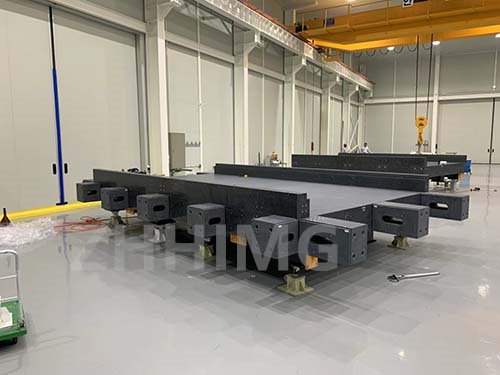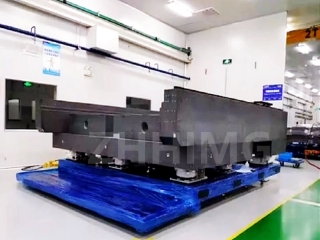First, the advantages of granite base
High rigidity and low thermal deformation
The density of granite is high (about 2.6-2.8 g/cm³), and the Young's modulus can reach 50-100 GPa, far exceeding that of ordinary metal materials. This high rigidity can effectively inhibit external vibration and load deformation, and ensure the flatness of the air float guide. At the same time, the linear expansion coefficient of granite is very low (about 5×10⁻⁶/℃), only 1/3 of aluminum alloy, almost no thermal deformation in the temperature fluctuation environment, especially suitable for constant temperature laboratories or industrial scenes with large temperature difference between day and night.
Excellent damping performance
The polycrystalline structure of granite makes it have natural damping characteristics, and the vibration attenuation time is 3-5 times faster than that of steel. In the process of precision machining, it can effectively absorb high-frequency vibration such as motor start and stop, tool cutting, and avoid the influence of resonance on the positioning accuracy of the moving platform (typical value up to ±0.1μm).
Long-term dimensional stability
After hundreds of millions of years of geological processes formed granite, its internal stress has been completely released, not like metal materials due to residual stress caused by slow deformation. The experimental data show that the size change of the granite base is less than 1μm/m during the 10-year period, which is significantly better than that of cast iron or welded steel structures.
Corrosion-resistant and maintenance-free
Granite to acid and alkali, oil, moisture and other environmental factors have a strong tolerance, there is no need to coat the anti-rust layer as regularly as the metal base. After grinding and polishing, the surface roughness can reach Ra 0.2μm or less, which can be directly used as the bearing surface of the air float guide rail to reduce assembly errors.
Second, the limitations of granite base
Processing difficulty and cost problem
Granite has a Mohs hardness of 6-7, requiring the use of diamond tools for precision grinding, processing efficiency is only 1/5 of metal materials. Complex structure of the dovetail groove, threaded holes and other features of the processing cost is high, and the processing cycle is long (for example, the processing of 2m×1m platform takes more than 200 hours), resulting in the overall cost is 30%-50% higher than the aluminum alloy platform.
Brittle fracture risk
Although the compressive strength can reach 200-300MPa, the tensile strength of granite is only 1/10 of it. Brittle fracture is easy to occur under extreme impact load, and the damage is difficult to repair. It is necessary to avoid stress concentration through structural design, such as using rounded corner transitions, increasing the number of support points, etc.
Weight brings system limitations
The density of granite is 2.5 times that of aluminum alloy, resulting in a substantial increase in the overall weight of the platform. This puts a higher requirement on the bearing capacity of the support structure, and the dynamic performance may be affected by inertia problems in scenarios requiring high-speed movement (such as the lithography wafer table).
Material anisotropy
The mineral particle distribution of natural granite is directional, and the hardness and thermal expansion coefficient of different positions are slightly different (about ±5%). This can introduce non-negligible errors for ultra-precision platforms (such as nanoscale positioning), which need to be improved by strict material selection and homogenization treatment (such as high-temperature calcination).
As the core component of high-precision industrial equipment, precision static pressure air floating platform is widely used in semiconductor manufacturing, optical processing, precision measurement and other fields. The choice of base material directly affects the stability, accuracy and service life of the platform. Granite (natural granite), with its unique physical properties, has become a popular material for such platform bases in recent years.
Post time: Apr-09-2025


